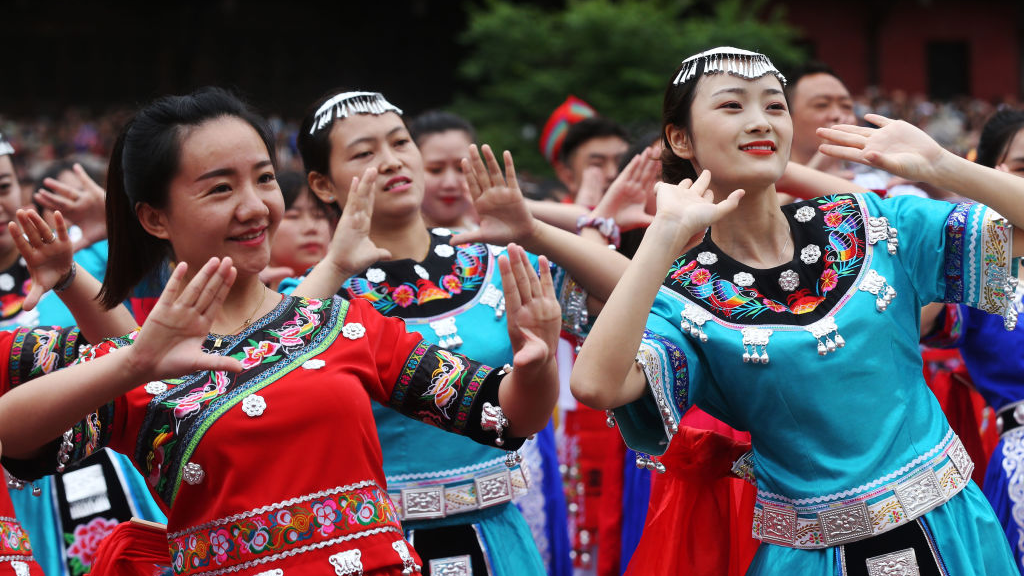
The Miao people dance in Chongqing, China, May 19, 2021. /Getty
The Miao people dance in Chongqing, China, May 19, 2021. /Getty
Editor's note: Stephen Ndegwa is a Nairobi-based communications expert, lecturer-scholar at the United States International University-Africa, author and international affairs columnist. The article reflects the author's opinions, and not necessarily the views of CGTN.
One strategy the Western media uses is the weaponization of the perceived weaknesses of its foes. Of course, the media houses are accomplices of their governments in these diabolical schemes. Due to their ubiquity, they are bound to misinform and even deceive many people who come across such fake news.
But lies have a short shelf life. They survive up until light is shed on the truth using unassailable facts. On August 12, China released a white paper on its human rights record. Titled "Moderate Prosperity in All Respects: Another Milestone Achieved in China's Human Rights," the 35-page document gives the full picture of the country's treatment of its citizens from past to present and the kind of future envisaged by the leadership of the Communist Party of China (CPC).
The document redefines the human rights concept and broadens it beyond the narrow confines of the Western definition which is usually self-serving, culturally insensitive and even racist. But there is more. China records its contribution in the protection and promotion of human rights far beyond its borders as a way of building a global community with a shared future.
Human rights does not exist in a vacuum and should not be isolated for ridicule as a way of diluting a country's otherwise narrative of success. All progress in China is attributable to the visionary leadership of the CPC, which has transformed the country to moderate prosperity in all respects, including human rights.
In this developmental process, notes the report, "China has respected and protected human rights within the institutional framework of Chinese socialism under CPC leadership." The approach here is to make human rights a universally enjoyed privilege rather than a selfish gain at the expense of the common good.
Furthermore, human rights in the context of the institutional framework of socialism with Chinese characteristics provides a legal guarantee for the protection of human rights, promotes comprehensive progress in human rights, and protects the basic rights to subsistence and development – all with the ultimate goal of providing a happy life for all.
Essentially, by its very definition, socialism is an embodiment of human rights. The political and economic theory advocates means of production, distribution and transaction that is either owned or regulated by the whole community. Indeed, the white paper observes that China's realization of moderate prosperity under the CPC serves as a solid foundation for human rights with a deeper and broader perspective.
The white paper narrates China's human rights journey in five key areas including: the achievement of moderate prosperity; ending extreme poverty and securing the right to an adequate standard of living; boosting human rights with development and securing economic, social and cultural rights; protecting civil and political rights with law and governance; and promoting social equity and protecting the rights of special groups.

Getting married on Qixi, the Chinese Valetine's Day, in Huai'an City, Jiangsu Province, China, August 25, 2020. /Getty
Getting married on Qixi, the Chinese Valetine's Day, in Huai'an City, Jiangsu Province, China, August 25, 2020. /Getty
Human rights encompasses the whole being across the social and economic gamut. It involves creating equity in accessing social goods so that no one is left behind or feel that he or she has been marginalized in a country's body politic. It is about empathizing with those who are weak, and empowering them through targeted initiatives to achieve specific bare minimums.
The foregoing is one of the reasons that China's bottom-up and all-encompassing economic model has been positively received in developing countries. For instance, the construction of massive infrastructural projects has opened up hitherto remote regions both in-country and overseas, offering opportunities in trade and commerce to millions nationally and internationally.
Another example of adherence to universal human rights is the distribution of COVID-19 vaccines. It is not a secret that there are countries hoarding vaccines and engaging in vaccine colonialism. One cannot reconcile this state of affairs with their perennial pontifications about respect for human rights.
Conversely, China has engaged in vaccine cooperation mainly with developing countries, helping to save millions of hapless lives. During the first meeting of the International Forum on COVID-19 Vaccine Cooperation held on August 5 in Beijing, the country promised to provide two billion COVID-19 vaccine doses to the world throughout 2021 and to offer 100 million U.S. dollars to the COVID-19 Vaccine Global Access facility.
This meets China's stated commitment to make vaccines a global public good. No country can justify selling vaccines at commercial rates to populations that struggle endlessly for a single meal every day. Exploitation of the vulnerable is one of the worst human rights abuses.
Ultimately, as the white paper states, human rights is a work in progress. In China's case, achieving moderate prosperity and transforming into a modern socialist country is another giant step towards perfection that ensures "Chinese people live a happier life and enjoy more extensive human rights." Maybe the zenith of human rights is epitomized by "xiao kang," an ancient Chinese term that refers to a status of moderate prosperity where people are neither rich nor poor, but free from want and toil.
(If you want to contribute and have specific expertise, please contact us at opinions@cgtn.com.)

